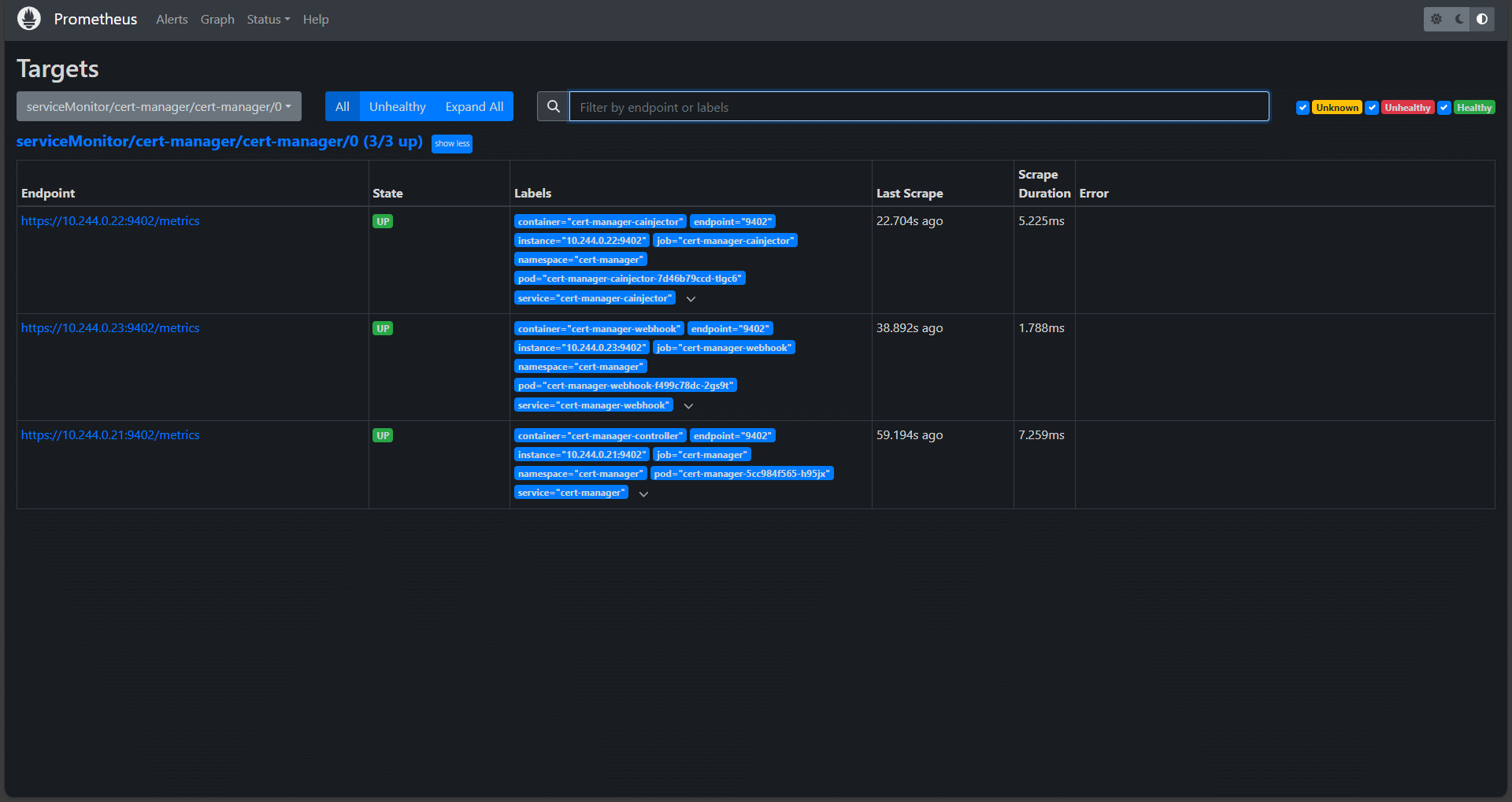Prometheus Metrics
To help with operations and insights into cert-manager activities, cert-manager exposes metrics in the Prometheus format from the controller, webhook and cainjector components. These are available at the standard /metrics endpoint on port 9402 of each component Pod.
Scraping Metrics
How metrics are scraped will depend how you're operating your Prometheus server(s). These examples presume the Prometheus Operator is being used to run Prometheus, and configure Pod or Service Monitor CRDs.
Helm
If you're deploying cert-manager with helm, a PodMonitor resource can be configured. This configuration should enable metric scraping, and the configuration can be further tweaked as described in the Helm configuration documentation.
prometheus:enabled: truepodmonitor:enabled: true
Regular Manifests
If you're not using helm to deploy cert-manager and instead using the provided regular YAML manifests, this example PodMonitor should be all you need to start ingesting cert-manager metrics.
apiVersion: monitoring.coreos.com/v1kind: PodMonitormetadata:name: cert-managernamespace: cert-managerlabels:app: cert-managerapp.kubernetes.io/name: cert-managerapp.kubernetes.io/instance: cert-managerspec:jobLabel: app.kubernetes.io/nameselector:matchExpressions:- key: app.kubernetes.io/nameoperator: Invalues:- cainjector- cert-manager- webhook- key: app.kubernetes.io/instanceoperator: Invalues:- cert-manager- key: app.kubernetes.io/componentoperator: Invalues:- cainjector- controller- webhookpodMetricsEndpoints:- port: http-metrics
TLS
TLS can be enabled on the metrics endpoint for end-to-end encryption. This is achieved either using pre-signed static certificates, or using the internal dynamic certificate signing.
Static certificates
Static certificates can be provided to the cert-manager to use when listening on the metric endpoint. If the certificate files are changed then cert-manager will reload the certificates for zero-downtime rotation.
Static certificates can be specified via the flags --metrics-tls-cert-file and --metrics-tls-private-key-file or the corresponding config file parameters metricsTLSConfig.filesystem.certFile and metricsTLSConfig.filesystem.keyFile.
The certificate and private key must be mounted into the controller pod for this to work, if cert-manager is deployed using helm the .volumes[] and .mounts[] properties can facilitate this.
An example Helm values file would be:
# values.yamlprometheus:enabled: trueconfig:metricsTLSConfig:filesystem:certFile: "/path/to/cert.pem"keyFile: "/path/to/key.pem"webhook:config:metricsTLSConfig:filesystem:certFile: "/path/to/cert.pem"keyFile: "/path/to/key.pem"cainjector:config:metricsTLSConfig:filesystem:certFile: "/path/to/cert.pem"keyFile: "/path/to/key.pem"
Dynamic certificates
In this mode cert-manager will create a CA in a named Secret, then use this CA to sign the metrics endpoint certificates. This mode will also take care of rotation, auto rotating the certificate as required.
Dynamic certificates can be specified via the flags --metrics-dynamic-serving-ca-secret-namespace, --metrics-dynamic-serving-ca-secret-name and --metrics-dynamic-serving-dns-names or the corresponding config file parameters metricsTLSConfig.dynamic.secretNamespace, metricsTLSConfig.dynamic.secretName and metricsTLSConfig.dynamic.dnsNames.
An example Helm values file would be:
# values.yamlprometheus:enabled: truepodmonitor:enabled: trueendpointAdditionalProperties:scheme: httpstlsConfig:serverName: cert-manager-metricsca:secret:name: cert-manager-metrics-cakey: "tls.crt"config:metricsTLSConfig:dynamic:secretNamespace: "cert-manager"secretName: "cert-manager-metrics-ca"dnsNames:- cert-manager-metricswebhook:config:metricsTLSConfig:dynamic:secretNamespace: "cert-manager"secretName: "cert-manager-metrics-ca"dnsNames:- cert-manager-metricscainjector:config:metricsTLSConfig:dynamic:secretNamespace: "cert-manager"secretName: "cert-manager-metrics-ca"dnsNames:- cert-manager-metrics
ℹ️ This configuration will result in a single new Secret
cert-manager/cert-manager-metrics-cacontaining a CA. The firstcontroller,webook, orcainjectorPod will create the CA Secret and the others will then use it.All the controller, webhook, and cainjector Pods will generate their own unique metrics serving certificates and sign them with the CA private key.
The
PodMonitoris configured to read the public certificate from the CA Secret and Prometheus will use that CA when it connects to the metrics servers of each of the matching Pods.All the serving certificates share the same DNS name. That same name must be added to the
PodMonitorand Prometheus will use that hostname when it connects to the metrics servers of each of the matching Pods.
Troubleshooting
Check the controller, webhook and cainjector logs to see the CA certificate and serving certificates being created and updated:
kubectl -n cert-manager logs -l app.kubernetes.io/instance=cert-manager --prefix
I0719 15:21:28.113411 1 dynamic_source.go:172] "Detected root CA rotation - regenerating serving certificates" logger="cert-manager"I0719 15:21:28.115018 1 dynamic_source.go:290] "Updated cert-manager TLS certificate" logger="cert-manager" DNSNames=["cert-manager-metrics"]
Check the connection to the metrics endpoint using kubectl port-forward and curl:
kubectl port-forward -n cert-manager deployment/cert-manager-webhook 9402curl --insecure -v https://localhost:9402/metrics
Check the health of the cert-manager scrape targets on the Prometheus status page:

Monitoring Mixin
Monitoring mixins are a way to bundle common alerts, rules, and dashboards for an application in a configurable and extensible way, using the Jsonnet data templating language. A cert-manager monitoring mixin can be found here https://github.com/imusmanmalik/cert-manager-mixin. Documentation on usage can be found with the cert-manager-mixin project.